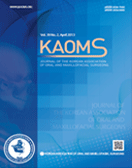Journal of the Korean Association of Oral and Maxillofacial Surgeons
- P-ISSN2234-7550
- E-ISSN2234-5930
- SCOPUS, KCI, ESCI
 ISSN : 2234-7550
ISSN : 2234-7550
A working paradigm for managing mandibular fractures under regional anesthesia
Vikas Meshram (Government Dental College and Hospital, Mumbai)
Prajwalit Kende (Government Dental College and Hospital, Mumbai)
Jayant Landge (Government Dental College and Hospital, Mumbai)
Neha Aggarwal (Government Dental College and Hospital, Mumbai)
Manish Tiwari (Private Practitioner, Bengaluru)
Abstract
Objectives: Isolated mandibular fractures contribute to approximately 45% of maxillofacial traumas. Improper management of mandibular fractures can cause myriad potential complications and can lead to serious functional and aesthetic sequelae. The objective of the study is to design a stepwise approach for managing isolated mandibular fractures using open reduction and internal fixation (ORIF) with regional anesthesia on outpatient basis.Materials and Methods: Patients with isolated mandibular fractures presenting to the department of maxillofacial surgery were selected for ORIF under regional anesthesia based on occlusion, age, socioeconomic status, general condition, habits, and allied medical ailments. Standard preoperative, intraoperative, and postoperative protocols were followed. All patients were followed up for a minimum of 4 weeks up to a maximum of 1 year.Results: Of 23 patients who received regional anesthesia, all but one had good postoperative functional occlusion. One patient was hypersensitive and had difficulty tolerating the procedure. Two patients developed an extraoral draining sinus, one of whom was managed with local curettage, while the other required hardware removal. One patient, who was a chronic alcoholic, returned 1 week after treatment with deranged fracture segments after he fell while intoxicated.Conclusion: With proper case selection following a stepwise protocol, the majority of mandibular fractures requiring ORIF can be managed with re-gional anesthesia and yield minimal to no complications.
- keywords
- Mandibular fractures, Regional anesthesia, Complications, Perioperative management, Champy’s lines
- Downloaded
- Viewed
- 0KCI Citations
- 0WOS Citations